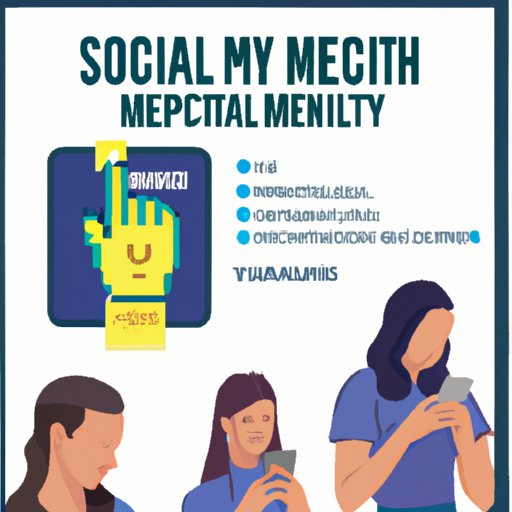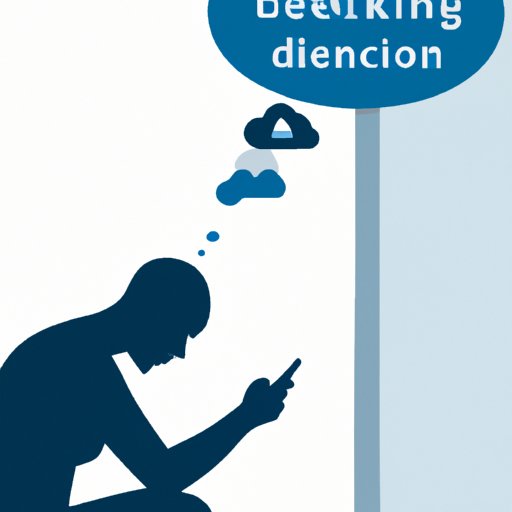Introduction
Social media has become an integral part of our daily lives. We use it to stay connected with friends, family, and colleagues; to stay informed about current events; and to share our thoughts, opinions, and experiences. But while social media can be a great tool for staying connected, it can also have a negative effect on our mental health.
The purpose of this article is to explore the impact of social media on mental health, from depression and anxiety to long-term effects such as reduced social interaction and low self-esteem. We’ll also discuss strategies for reducing the negative effects of social media and improving mental health.
The Impact of Social Media on Mental Health
Social media usage can have both positive and negative effects on mental health. On the one hand, it can help us stay connected with people who are important to us and provide a platform for sharing our thoughts and experiences. On the other hand, too much time spent on social media can lead to feelings of isolation, depression, anxiety, and stress.

How Social Media Usage Influences Mental Health
Social media usage can influence mental health in a number of ways. For example, it can:
- Increase feelings of loneliness and isolation
- Lead to negative comparisons and feelings of inadequacy
- Cause sleep disturbances
- Increase stress and anxiety
- Promote unhealthy eating habits
- Negatively affect relationships

Examples of Negative Effects of Social Media on Mental Health
One of the most common negative effects of social media on mental health is depression. Studies have shown that people who spend more time on social media are more likely to experience symptoms of depression, such as feelings of sadness, loneliness, and hopelessness. Other negative effects include anxiety, low self-esteem, and increased stress.

Analyzing the Link Between Social Media and Depression
There are several possible causes of social media-induced depression. For example, spending too much time on social media can lead to feelings of loneliness and isolation, which can in turn lead to depression. Additionally, comparing ourselves to others on social media can lead to feelings of inadequacy, which can also contribute to depression.
It’s important to be aware of the warning signs of social media-related depression, such as feeling isolated, having difficulty sleeping, or feeling overwhelmed by social media. If you notice any of these signs, it may be time to take a break from social media and focus on your mental health.
Examining the Long-Term Effects of Social Media on Mental Health
The long-term effects of social media on mental health can be just as damaging as the short-term effects. One of the most significant long-term effects is a reduced ability to interact with people face-to-face. As we become accustomed to communicating through social media, we may find it difficult to engage in meaningful conversations with people in person.
Another long-term effect is a decrease in self-esteem and self-worth. Constantly comparing ourselves to others on social media can lead to feelings of inferiority and low self-esteem. These feelings can have a lasting impact on our mental health.
Understanding How Social Media Influences Anxiety and Stress
Social media can also lead to increased levels of anxiety and stress. This is because social media can be overwhelming and stressful at times, and it can also lead to feelings of guilt if we don’t keep up with our friends’ posts or respond to messages quickly enough.
It’s important to be aware of the symptoms of social media-induced anxiety and stress, such as feeling overwhelmed, having trouble concentrating, or spending too much time on social media. If you notice any of these signs, it may be time to limit your social media usage and focus on taking care of yourself.
Exploring Ways to Reduce the Negative Effects of Social Media on Mental Health
Fortunately, there are ways to reduce the negative effects of social media on mental health. One of the most effective strategies is to limit your social media usage. Setting limits on how much time you spend on social media can help reduce feelings of loneliness, anxiety, and stress.
It’s also important to develop positive coping mechanisms, such as practicing mindfulness, engaging in physical activity, or talking to a friend or therapist. These strategies can help you manage your emotions and reduce the negative effects of social media on your mental health.
Conclusion
In conclusion, social media can have both positive and negative effects on mental health. Too much time spent on social media can lead to feelings of loneliness, depression, anxiety, and stress. It can also have long-term effects such as reduced social interaction and low self-esteem. However, by limiting social media usage and developing positive coping mechanisms, we can reduce the negative effects of social media on our mental health.
The key takeaway from this article is that it’s important to be mindful of how social media is affecting our mental health. Taking steps to limit our social media usage and developing positive coping strategies can help us maintain our mental health and well-being.
(Note: Is this article not meeting your expectations? Do you have knowledge or insights to share? Unlock new opportunities and expand your reach by joining our authors team. Click Registration to join us and share your expertise with our readers.)
